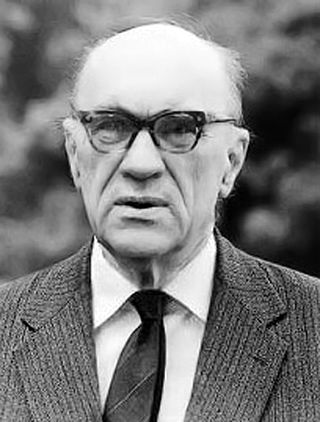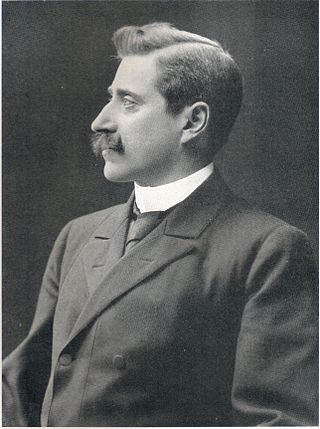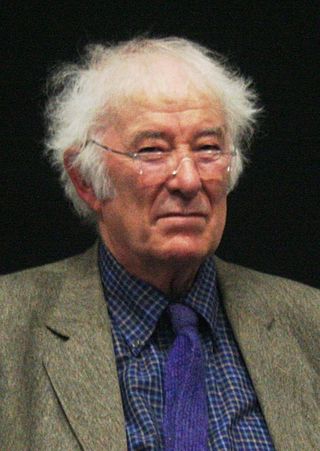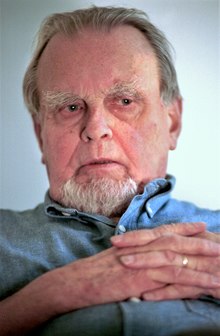
Czesław Miłosz was a Polish-American poet, prose writer, translator, and diplomat. Regarded as one of the great poets of the 20th century, he won the 1980 Nobel Prize in Literature. In its citation, the Swedish Academy called Miłosz a writer who "voices man's exposed condition in a world of severe conflicts".

Maria Wisława Anna Szymborska was a Polish poet, essayist, translator, and recipient of the 1996 Nobel Prize in Literature. Born in Prowent, she resided in Kraków until the end of her life. In Poland, Szymborska's books have reached sales rivaling prominent prose authors', though she wrote in a poem, "Some Like Poetry", that "perhaps" two in a thousand people like poetry.

Polish literature is the literary tradition of Poland. Most Polish literature has been written in the Polish language, though other languages used in Poland over the centuries have also contributed to Polish literary traditions, including Latin, Yiddish, Lithuanian, Russian, German and Esperanto. According to Czesław Miłosz, for centuries Polish literature focused more on drama and poetic self-expression than on fiction. The reasons were manifold but mostly rested on the historical circumstances of the nation. Polish writers typically have had a more profound range of choices to motivate them to write, including past cataclysms of extraordinary violence that swept Poland, but also, Poland's collective incongruities demanding an adequate reaction from the writing communities of any given period.

Robert L. Hass is an American poet. He served as Poet Laureate of the United States from 1995 to 1997. He won the 2007 National Book Award and shared the 2008 Pulitzer Prize for the collection Time and Materials: Poems 1997–2005. In 2014 he was awarded the Wallace Stevens Award from the Academy of American Poets.

Jarosław Leon Iwaszkiewicz, also known under his literary pseudonym Eleuter, was a Polish writer, poet, essayist, dramatist and translator. He is recognized for his literary achievements, beginning with poetry and prose written after World War I. After 1989, he was often presented as a political opportunist during his mature years lived in communist Poland, where he held high offices. He was nominated for the Nobel Prize in Literature four times. In 1988, he was recognized as a Righteous Among the Nations for his role in sheltering Jews during World War II.

Adam Zagajewski was a Polish poet, novelist, translator, and essayist. He was awarded the 2004 Neustadt International Prize for Literature, the 2016 Griffin Poetry Prize Lifetime Recognition Award, the 2017 Princess of Asturias Award for Literature and the 2018 Golden Wreath of Poetry at the Struga Poetry Evenings. He was considered a leading poet of the Generation of '68, or Polish New Wave, and one of Poland's most prominent contemporary poets.

Oscar Vladislas de Lubicz Milosz was a Lithuanian French language poet, playwright, novelist, essayist and representative of Lithuania at the League of Nations. His literary career began at the end of the nineteenth century during la Belle Époque and reached its high point in the mid-1920s with the books Ars Magna and Les Arcanes, in which he developed a highly personal and dense Christian cosmogony comparable to that of Dante in The Divine Comedy and John Milton in Paradise Lost. A solitary and unique twentieth-century metaphysician, his poems are visionary and often tormented. He was a distant cousin of Polish writer Czesław Miłosz, winner of the Nobel Prize for literature in 1980.
Polish poetry has a centuries-old history, similar to the Polish literature.
A Treatise on Poetry is book-length poem in Polish by Nobel Prize-winning poet Czesław Miłosz on Polish literature, poetry and history from 1900 to 1949. Written in 1955 and 1956, it was first published in book form in 1957 and won that year's literary prize from Kultura. The Treatise is considered one of Miłosz's greatest works.
Król Popiel i inne wiersze is a poetry collection by Polish poet Czesław Miłosz. It was first published in 1962 in Paris by Polish Literary Institute. There were underground editions of the book in Poland, also before 1989.

The 1966 Nobel Prize in Literature was divided equally between Shmuel Yosef Agnon (1888–1970) "for his profoundly characteristic narrative art with motifs from the life of the Jewish people" and Nelly Sachs (1891–1970) "for her outstanding lyrical and dramatic writing, which interprets Israel's destiny with touching strength."

The 1916 Nobel Prize in Literature was awarded to the Swedish poet and prose writer Verner von Heidenstam (1859–1940) "in recognition of his significance as the leading representative of a new era in our literature." Heidenstam was the second Swedish Nobel laureate in Literature after Selma Lagerlöf in 1909.

The 1972 Nobel Prize in Literature was awarded to the German author Heinrich Böll (1917–1985) "for his writing which through its combination of a broad perspective on his time and a sensitive skill in characterization has contributed to a renewal of German literature." Böll is the fifth German author to be recipient of the prize.

The 2011 Nobel Prize in Literature was awarded to the Swedish poet Tomas Tranströmer (1931–2015) "because, through his condensed, translucent images, he gives us fresh access to reality." He is the seventh Swedish author to become a recipient of the prize after Harry Martinson and Eyvind Johnson who were jointly awarded in 1974.

The 1996 Nobel Prize in Literature was awarded to the Polish poet Wisława Szymborska (1923–2012) "for poetry that with ironic precision allows the historical and biological context to come to light in fragments of human reality." Szymborska is the 9th female recipient and the 5th Nobel laureate from Poland after Czesław Miłosz in 1980

The 1995 Nobel Prize in Literature was awarded to the Irish poet Seamus Heaney (1939–2013) "for works of lyrical beauty and ethical depth, which exalt everyday miracles and the living past." He is the fourth Irish Nobel laureate after the playwright Samuel Beckett in 1969.

The 1992 Nobel Prize in Literature was awarded to the Saint Lucian poet Derek Walcott (1930–2017) "for a poetic oeuvre of great luminosity, sustained by a historical vision, the outcome of a multicultural commitment." He became the first and only Caribbean writer to be awarded with the prize.

The 1990 Nobel Prize in Literature was awarded to the Mexican poet and diplomat Octavio Paz (1914–1998) "for impassioned writing with wide horizons, characterized by sensuous intelligence and humanistic integrity." He is the only recipient of the Nobel Prize in Literature from Mexico.

The 1906 Nobel Prize in Literature was awarded to the Italian poet Giosuè Carducci (1835–1907) "not only in consideration of his deep learning and critical research, but above all as a tribute to the creative energy, freshness of style, and lyrical force which characterize his poetic masterpieces." He was the first Italian author to receive the prize and was followed by Grazia Deledda in 1926.

The 1987 Nobel Prize in Literature was awarded to the Russian–American poet and essayist Joseph Brodsky (1940–1996) "for an all-embracing authorship, imbued with clarity of thought and poetic intensity."

















